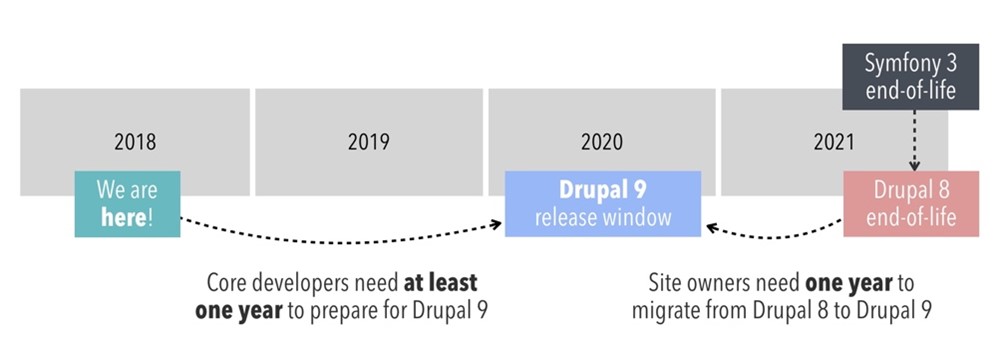


Renoj Raphael
Drupal 7 to 9: Why, When and How Should You Migrate
Drupal is celebrating 20 years of an exciting journey of continued innovation. As a pioneer in content delivery across multiple channels, after 2 decades of existence it now stands at the forefront of the Digital Experience Platform (DXP) on the web, with sturdy content management tools, APIs for multichannel publishing, and one and the only digital hub to enable and support your digital presence.
Is it time to migrate from Drupal 6/7/8 to Drupal 9?
Since its launch in 2011, Drupal 7 became the popular content management tool to build websites and content-rich portals quickly. The open community support helped to make more than 11,000 contributing modules and more than 600 custom themes. The additional contributing modules played a considerable role in expanding the digital presence of enterprises with eCommerce, community platforms, project management, and many more valuable tools for day-to-day business.
As of today, almost 70% of the Drupal websites are running in Drupal 7 or lower versions. Although Drupal 7 gives us all the benefits of the content management tool along with the additional modules to drive your business, it’s time to migrate. Drupal 9 is the latest version released and the right choice to redefine the future of digital experience.
Drupal 9, an API-first platform with a powerful decoupled CMS, is a great fit to improve your customer experience management.
The question one might have is, “Do I need to migrate to Drupal 9 when my websites are running smoothly with the current version?”
As a Drupal development partner, our answer is “yes”. That’s because Drupal 7 is reaching the end of life by the end of November 2022. In 2018, Dries Buytaert announced the Drupal 7 end date as November 2021, but the Covid-19 impact extended it for one more year. If you continue to run your website on Drupal 7 after November 2022, you could face the following challenges.
Lack of Drupal 7 Code Support
Drupal 7 will stop getting community support officially. The leading hosting providers such as Acquia and Pantheon will stop the Drupal 7 support or provide little maintenance help at a higher cost. There is also a chance of the web pages being flagged as insecure in the third-party scanning tools. The other challenge includes integration with third-party systems.
Insufficient Security Support
The Official Drupal Security team will not extend support, stopping release of any security patches or available updates for Drupal 7 websites after November 2022. The outdated and insecure versions will leave your websites vulnerable to cybersecurity threats and data security compliance challenges.
Less Contributed Modules
Drupal community is based on thousands of contributed modules. Therefore, after the end date of Drupal 7, the community will reduce the effort to build the new modules or keep the Drupal 7 version updated. However, some of the contributed modules will run into several performance issues in the future.
Drupal 7 is reaching end-of-life; Drupal Association, Cloud hosting providers such as Acquia and Pantheon will soon withdraw the support.
Poor Website Performance
As we discussed earlier about the security support and the contributed modules that will expose you to vulnerabilities and decrease your website’s SEO score. The overall lack of support will also directly or indirectly affect the website’s performance.
Drupal 7, 8, and 9: The Journey
Drupal is in a transition phase after a steady version of Drupal 7 being used for a long time, covering 70% of the Drupal sites in the world. Drupal core platform depends on three major third-party libraries such as Symfony, Twig, and Guzzle, which means that we need to sync with their release timelines and their roadmaps.
Drupal 7 websites will face performance challenges as the contributed modules will no longer be supported for D7, and site security is expected to take a hit.
Just as Drupal 7 will end the support in November 2022, Drupal 8 will be stopping the support by November 2021. The most significant dependency in D8 is Symfony 3, and Symfony’s official roadmap shows the end-of-life date to Symfony 3 as of November 2021. So the Drupal must adopt Symphony 4 or 5, which means switching to Drupal 9 is logical and imperative.
If you are on Drupal 8, all you need to do is keep your Drupal 8 site up-to-date, and you’ll be ready for Drupal 9. Drupal 8 to 9 upgrade will be much faster and easier than the previous versions of Drupal.

Drupal 9: Digital Experience Platform for Future
As a future-ready Digital experience platform (DXP), Drupal 9 always stands apart from the rest of the CMS platforms with a decoupled /headless architecture. It gives you the freedom to publish the content across multiple channels, such as mobile, wearables, kiosks, and many other devices, while publishing it in just one place. In addition to that, it also gives the flexibility to use any front-end technology such as Angular, React, Vue, and Gatsby to display the content.
With Drupal 9, your marketing team always has the flexibility to define a No-code/less-code approach with the latest layout builder to publish content quickly with a responsive and SEO-friendly web page or a campaign landing page. It brings greater freedom to the marketers, allowing them to focus on the campaigns and the development team to focus on building next-generation digital customer experience management.
Conclusion
To sum it up, plan your migration path based on your unique business needs and goals. Identifying the proper roadmap to exceed expectations is imperative for your road to success, and Drupal 9 helps you with that. It facilitates easy migration of the digital experience platform, making the shift to a new version or undertaking future upgrades a seamless experience.
Please connect with ACL DIGITAL for end-to-end Drupal 9 migration and upgrade services, including design, development, strategy, integration, support, and maintenance to create engaging and customer-centric digital experiences.




